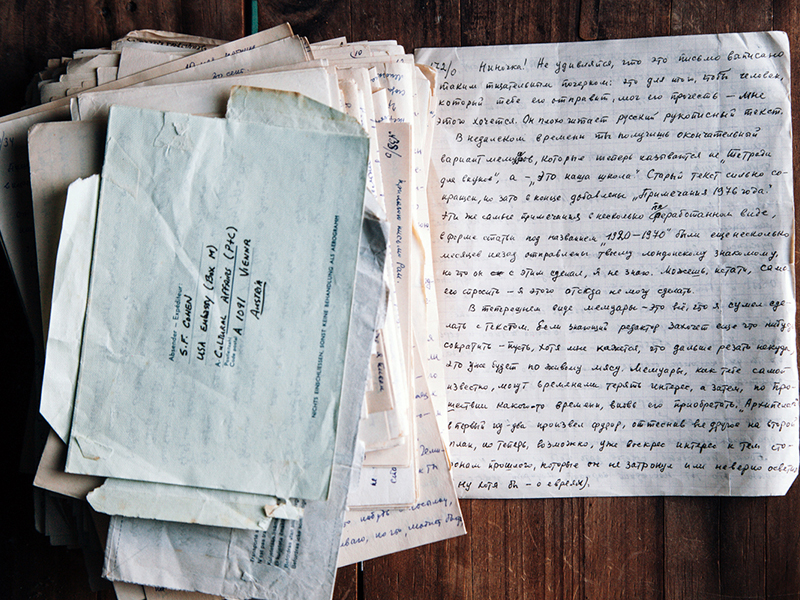A few photographs are all Yuula Benivolski’s parents were able to take with them as mementos, when they quickly left the Soviet Union for Israel in 1990.
Benivolski, the eldest of three children, was 10 at the time. The family remained in Israel for 10 years, before going to Canada and settling in Toronto. They had lived in northern Israel and felt they could no longer endure the missiles flying over the border.
By the age of 20, Baitalsky had immigrated twice under duress and adapted to two new countries. Her memory of her birthplace was starting to fade, but she had a sketchy knowledge of someone on her father’s side of historical significance – a dissident who toiled for years in the gulags.
In 2016, Benivolski, by then an established artist, visited Israel to see her great-aunt Nina Baitalsky. She was the one who had sent the invitation from Israel that allowed Benivolski’s family to escape the deteriorating situation in Russia.
Now in her late 80s, Nina Baitalsky asked her great-niece if she would be interested in a sheaf of old letters, as her own children were not.
Those well-preserved papers were written by Mikhail Baitalsky, the political prisoner Benivolski had heard about, to his daughter who had managed to get out of the Soviet Union in 1974 (he died in 1978).
READ: SURVIVOR TURNS SCRAP INTO ART IN NEW EXHIBIT
Benivolski was overjoyed: the dozens of letters represented the first tangible reminder she had of her Russian heritage. It set her on a quest to research her great-uncle, and then to create a photo and video installation, which is being exhibited at the Museum of Jewish Montreal (MJM) until May 5.
Titled, The Ocean Between Us, the exhibition seeks to convey the bond immigrants have, not so much with the countries they left, but to the relatives they left behind. These ties endure across generations, suggests Benivolski, who completed a master of fine arts at Concordia University in 2010.
As it turned out, researching Baitalsky was not that difficult. A journalist, he wrote a memoir called Notebooks for the Grandchildren.
Baitalsky, who was born in Ukraine in 1903, was among the young revolutionaries – committed Trotskyists – who risked their lives by opposing Stalin. As a Jew, he was also disturbed by the revival of pre-revolution anti-Semitism under the tyrannical leader.
Baitalsky was arrested three times, starting in 1936, and was imprisoned twice in the notorious Vorkuta labour camp. Finally released in 1956, he returned to Moscow and devoted his remaining years to his memoirs, even though he knew there was no chance of them being published.
“He was on the KGB watch list till the day he died,” said Benivolski. “He kept a packed suitcase by the door. All his letters and phone calls were monitored.”

He tried to emigrate, but like most Jews at the time, was refused.
The handwritten letters to his daughter were routed through a friend in Helskinki, who forwarded them to Israel. He devised a numeric code to ensure she received each letter.
He was wise enough not to write about anything that would raise red flags, although some references appear to have been encrypted, Benivolski said.
At the MJM, a selection of the letters is artfully arranged in a glass case. On the wall is a photo of Baitalsky and his wife.
Benivolski returned to Russia for the first time in 28 years last fall. In the exhibit is a photo she took of the massive concrete apartment building in Moscow, where she spent the first decade of her life.
She went to their old unit on the 11th floor, and the current occupant happily invited her in.
He was on the KGB watch list till the day he died.
– Yuula Benivolski
The Ocean Between Us builds on the artist’s personal journey. Benivolski spent several months in Montreal interviewing Jewish immigrants from Europe, North Africa and the Middle East. She documented the stories of 25 of them, often spending hours with each.
They hold photos of parents, grandparents or other relatives who never came to Canada. Objects they took with them are lovingly shown off – treasured heirlooms as simple as a sugar bowl or a Kiddush Cup.
Visitors are free to leaf through a box of more photos that could not be mounted in the MJM’s very limited space.
After dark, some images and excerpts are projected on the MJM’s storefront windows, at the corner of St-Laurent Boulevard and Duluth Avenue, against a background of churning waters.
“I hope people see these faces and stories, and think about those today seeking refugee status who are having a hard time getting in because the borders are closed, and what would be missing from Montreal life if other immigrants had not come here before,” said Benivolski.
Despite the differences in their experiences, Benivolski found a kinship with her subjects, which she thinks is natural among people who have been, more or less, forced to pull up stakes.
Her great-uncle did, in a sense, finally make it to Israel: friends smuggled his ashes out and buried them in Herzliya.






